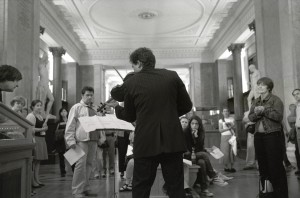
- Playing Dmitri Smirnov’s ‘Amore Sola’ in the Enlightenment gallery-the composer keeping a very close eye! Photo: Richard Bram

British Musem-Gallery 33. 23rd September PSS with Mihailo Trandafilovski (Playing Nigel Clarke, Dafina Zeqiri, Yigit Kolat, Shen Yi, Bartok, Scelsi, Evis Sammoutis, Tartini, Michael Hersch, and Trandafilovski!)
A History of the World in 100 objects:
Four Late Evenings….
Peter Sheppard Skærved
New sounds have always flooded across musical borders by means of trade and travel. The first bowed string instruments were brought to Europe from Asia in the century before the Renaissance. By the late 17th century, the violin had anchored itself into the musical practises of both secular and religious celebrations and observation, from feasting to prayer. But it must not be forgotten that the excitement about music is also centred on a particular fascination with the tools that are used to make music, both as historical objects, objects of inspiration, and objects of change. The violin is the ultimate example of this-an extraordinary piece of technology, capable of extraordinary flexibility, and almost limitless potential for ‘up grades’ and alteration. Its function and meaning have been in more or less constant flux for nearly 500 years.
*=works especially composed for the British Museum
As the series progresses live recordings from the events will appear on this page. Please be aware that these have been heavily filtered-the concerts take place in a living space, with people moving around, and enjoying the galleries. This is part of the fun-music as far from the anechoic chamber as possible-back in the salon!
Feasting (27 May) 1830-2030
Vigée-le Brun
“Beautiful, good, harmonious music should be heard during a meal. The musicians placed above the diners on a large stage. I am of the opinion that…it is the most charming thing to hear music while one is at table. It is only thing that I would wish were I to become a very grand lady…or extremely rich-for I prefer music to all the silly chit-chat of people eating.”
(Tom. 1, Pp.330-1) Vigée-le Brun
More infomation: Feastingprogramme[1]
Georg Phillip Telemann – Fantasies Telemann B flat at the BM , Telemann E flat at the BM
Laurie Bamon – Contemplating Ida
DmitriSmirnov – Amore Sola*
Judith Bingham – We Two (The Lost Works of Paganini) Bingham at the bM
Michael Alec Rose – Palimpsest (the Grays Inn Hand Axe)* Rose at the BM
Trad. Knud Larsens Halling (PSS, after Halvorsen, after Knud Dahle) Knud Larsens Halling
The Telemann Fantasies are the archetypical 18th Century domestic piece-music of the highest quality designed to be played at home at the table, as the companion piece to eating and conversation. These will be presented alongside works by living composers responding to the secular environment of the home, dining and providing food.
Religion (24 June) 1830-2030
Franz Ignaz Biber – Guardian Angel, companion of Man
Johann Sebastian Bach – Sonate BWV1001
Lars Bagger – Chorale (and other works)*
Oliver Waespi – Aureole*
Sadie Harrison – Bhavad Khair Baqi!
Jim Aitchison – Fugue Refractions-after Laocoon *
A group of recent pieces grouped around the last of Franz Ignaz Biber’s Rosary Sonatas. The baroque ‘sonata’ was explicitly linked to religious observance. Four living composers respond to Christian, Buddhist, Islamic and Ancient Greek themes. These range from the most painstaking consideration of an 18th century ‘prayer ring’, to music based on a mosque garden outside Kabul.
Trade and Travel (23 September) 1830-2030
Giuseppe Tartini – Sonata ‘through tempest’s horror’
Dafina Zeqiri – Dream
Nigel Clarke – Voices in the Sand (Turfan)
Michael Hersch – in the Snowy Margins
Mihailo Trandafilovski – Fragments – Light* & In the Hills
Tom Myron – Merian Etude*
Ian Wilson – Cartographies
Shen Yi – Tajik Dance
The Istrian composer Giuseppe Tartini straddled the east and west. Best known as an Italian composer, he was born in modern day Slovenia; his music never lost the flavour of the Balkan meeting point. Living composers from the Balkans, Xinjiang, UK and US, face up to questions of travel and alienation.
Objects and Today’s world (14 October) 1830-2030
Philip Glass – Strung out
David Gorton – Rosetta Caprices*
Jean Hasse – Collections Considered*
Paul Pellay – Evolving to…*
Paul Archbold – Gauge Symmetries
Howard Skempton – Tally* & Helix
The tally sticks in the Enlightenment gallery are a powerful symbol of our times, dominated by invoices and receipts. Alongside these, composers respond to the original translation programme, the Rosetta stone, to the idea of a modern collection of objects, and to the astounding modern notion of our place in the universe.
Programme subject to change. Photography and filming will be taking place during the evening.

- Playing Jim Aitchison’s ‘Fugue Refractions’ based on the Laocoon. Composer Oliver Waespi behind. Photo: Richard Bram

- Playing Lars Bagger’s ‘Chorale’. Composers Dmitri Smirnov and Paul Pellay at left. Photo: Richard Bram
Following on from the success of the the 2006 project in the Enlightenment Gallery, my collaboration with the British Museum is about to develop. News on this to follow. In the meantime, here are some wonderful photographs of this unique atmosphere to work and experiment, taken by Richard Bram.

Posted on February 21st, 2010 by Peter Sheppard Skaerved